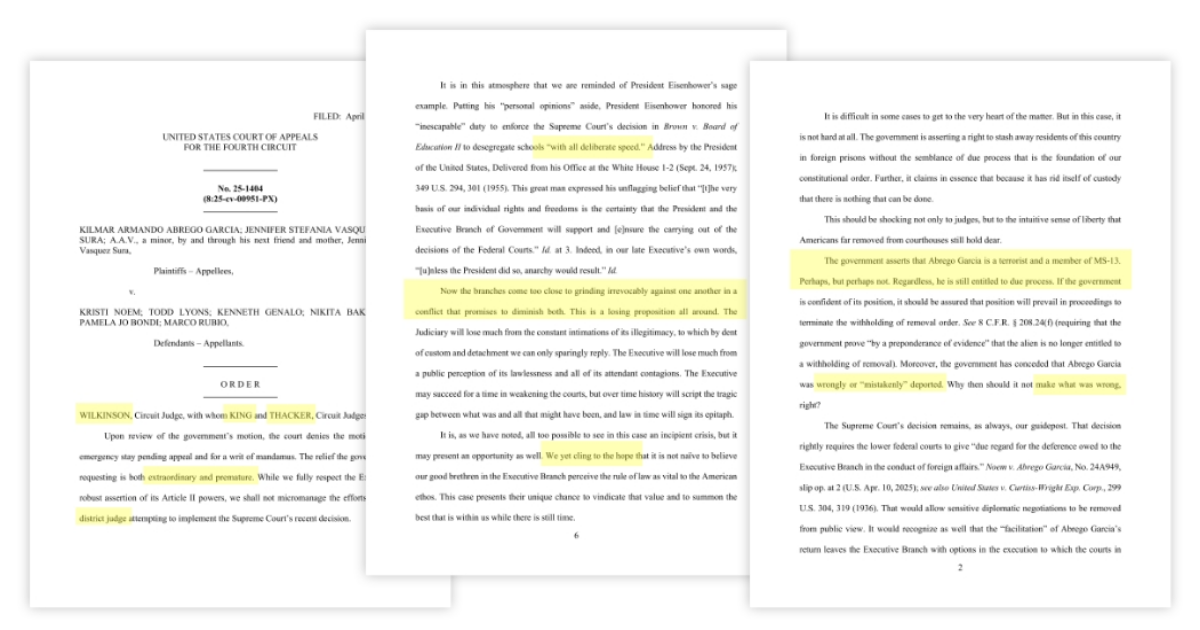


A federal appeals court in Virginia issued a striking opinion on Thursday, reaffirming that the Trump administration had to take a more active approach in seeking the release of a Maryland man, Kilmar Armando Abrego Garcia, who was deported to El Salvador last month despite a court order expressly forbidding him from being sent there.
But the opinion, authored by Judge J. Harvie Wilkinson III, a conservative jurist appointed by President Ronald Reagan, contained far more than simple legal instructions to the White House. The brief order also rebuked Trump officials for their apparent disregard of the bedrock principles of due process and for allowing a man whom they have acknowledged they wrongfully deported to continue to languish in a foreign prison.
At the same time, Judge Wilkinson, in an almost elegiac tone, gave an emphatic reminder that American democracy rests in part on mutual respect between the executive and judicial branches and lamented recent attacks by President Trump and his allies on the federal courts.
The New York Times annotated the court’s opinion.

1
Judge J. Harvie Wilkinson III, the opinion’s author, was appointed by President Ronald Reagan and is widely admired. President George W. Bush considered naming him to the Supreme Court.
— Adam Liptak
2
Judge Robert B. King, who was appointed by President Bill Clinton, joined Judge Wilkinson’s opinion.
— Adam Liptak
3
As did Judge Stephanie D. Thacker, who was appointed by President Barack Obama.
— Adam Liptak
4
The administration has been extremely assertive in seeking emergency relief from rulings against it.
— Adam Liptak
5
The opinion goes out of its way to praise Judge Paula Xinis, who has been handling the case in the Federal District Court in Maryland.
— Adam Liptak

6
The Trump administration has repeatedly asserted Kilmar Armando Abrego Garcia, the man it mistakenly sent to El Salvador, is a gang member and terrorist. But Judge Wilkinson is suggesting those accusations are a sideshow to the central issue in the case: that the government wrongly deported a man to a foreign prison and has now effectively washed its hands of him.
— Alan Feuer
7
In a Supreme Court brief, the administration wrote that “the United States concedes that removal to El Salvador was an administrative error.”
— Adam Liptak
8
In his earlier opinion, Judge Wilkinson offered a blunt assessment: “There is no question that the government screwed up here.”
— Adam Liptak

9
That balance largely tracked Judge Wilkinson’s analysis in an earlier opinion in the case. He said Judge Xinis had been right to instruct the government to “facilitate” Mr. Abrego Garcia’s release. But he seemed wary of endorsing another word she had used: “effectuate.”
— Adam Liptak
10
Lawyers for the Justice Department have said that the White House is in fact willing to “facilitate” Mr. Abrego Garcia’s release from Salvadoran custody. But they have offered a narrow interpretation of the word, suggesting that the administration can take an entirely passive posture. Judge Wilkinson is saying that the word “facilitate” requires a more active approach from Trump officials.
— Alan Feuer

11
Chief Justice John G. Roberts Jr. has also said that criticism can be valuable to the judiciary. But in a December report he chastised “elected officials from across the political spectrum” who “have raised the specter of open disregard for federal court rulings. These dangerous suggestions, however sporadic, must be soundly rejected.”
— Adam Liptak

12
President Trump last month said on social media that judges who ruled against him should be impeached. Chief Justice Roberts then issued a rare rebuke: “For more than two centuries, it has been established that impeachment is not an appropriate response to disagreement concerning a judicial decision. The normal appellate review process exists for that purpose.”
— Adam Liptak

13
That phrase is at war with itself and has been criticized for greenlighting Southern defiance of Brown v. Board of Education, the landmark decision integrating public schools. In a 2011 interview, Justice John Paul Stevens said that “a more decisive, prompt decision might have avoided some of the resistance that developed.”
— Adam Liptak
14
Judge Wilkinson has taken has an almost mournful tone about the controversy brewing between the courts and the White House in this case. On Tuesday, the trial judge overseeing it announced that she was opening a high-stakes inquiry into whether administration officials ignored orders from both her and the Supreme Court to work toward securing Mr. Abrego Garcia’s release.
— Alan Feuer
15
Judge Wilkinson, despite his evident concerns, says he remains optimistic that the White House will not persist in seeking an open and damaging confrontation with the courts.
— Alan Feuer

